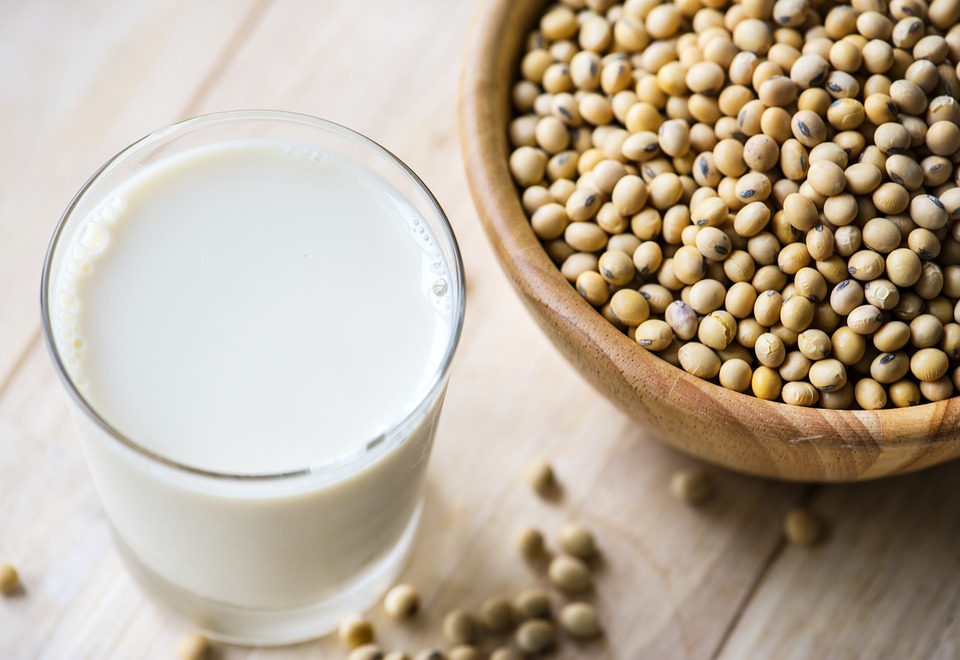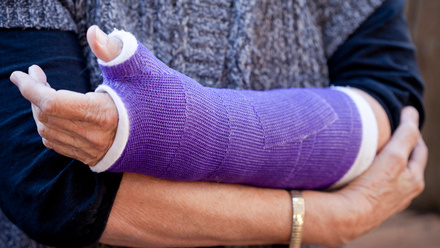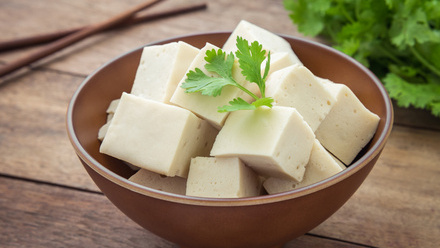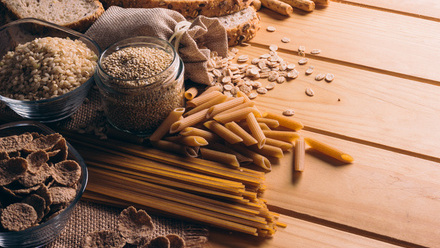Calcium is an important nutrient for people of all ages and it’s not just for strong bones and teeth! This Food Fact Sheet lists how much calcium different people need and what foods and drinks are good sources of it.

What is calcium and why do I need it?
Calcium is an essential mineral that is needed to maintain strong bones. It is also needed for healthy muscle and nerve function.
How much calcium do I need?
Daily guideline amounts
|
Group |
Age (years) |
Calcium (mg) per day |
|
Infants |
Under 1 |
525 |
|
Children |
1-3 4-6 7-10 |
350 450 550 |
|
Adolescents |
11-18 |
800 (girls) 1000 (boys) |
|
Adults |
19- 55 |
700 |
|
Breastfeeding mums |
|
1250 |
| Women following the menopause and men over 55 years | 1200 | |
|
People living with coeliac disease* |
19+ |
1000-1500 |
|
People living with osteoporosis |
19+ |
700 (up to 1000mg on osteoporosis drug treatments) |
|
Inflammatory Bowel disease (while taking corticosteroids)* |
19+ |
800-1000 |
* Discuss the need for a calcium supplement with your doctor or dietitian.
You are more at risk of calcium deficiency if you:
- are on a cow’s milk or lactose-free diet
- live with coeliac disease
- live with osteoporosis
- are breastfeeding
- are post-menopausal
Where do I get calcium from?
|
Calcium in dairy products |
Quantity |
Calcium (mg) |
|
Cow’s milk, including lactose free |
200ml |
240 |
|
Sheep’s milk |
200ml |
340 |
|
Goat’s milk |
200ml |
200-240 |
|
Cheese: Cheddar Edam/Halloumi Cottage |
matchbox-size: 30g 100g |
240 120 |
|
Cheese triangle |
1 triangle (15-17.5g) |
120 |
|
Yoghurt (plain) |
150g |
240 |
|
Fromage frais |
1 pot (50g) |
60 |
|
Rice pudding or custard pots |
1 pot (55g) |
60 |
|
Malted milk drink |
25g serving in 200ml semi-skimmed milk |
800 |
|
Rice pudding |
½ large tin (200g) |
180 |
|
Custard - tinned |
1 serving (120ml) |
120 |
|
Milk chocolate |
30g |
70 |
|
Non dairy sources of calcium |
||
|
Calcium-fortified plant-based alternatives to milk e.g. soya, oat, nut, coconut, pea, rice* drinks |
100 ml |
120-190 |
|
Soya bean curd/tofu (only if set with calcium chloride (E509) or calcium sulphate (E516), not nigari) |
100g (uncooked weight) |
300 |
|
Calcium-fortified soya, coconut or oat yoghurt and soya dessert or custard |
100g |
120-210 |
|
Calcium-fortified coconut cheese |
1 portion (30g) |
45-220 |
|
Calcium-fortified infant cereals |
1 serving (20g) |
120 |
|
Calcium-fortified cereals |
30g serving |
135-175 |
|
Calcium-fortified instant hot oat cereal |
1 tbsp dry cereal (15g) |
200 |
|
Calcium-fortified bread |
1 slice (37-50g) |
85-180 |
|
Sardines (with bones) (in tomato sauce, olive oil, brine) |
½ tin (60g) |
240 |
|
Pilchards (with bones) |
1 serving (60g) |
150 |
|
Tinned salmon (with bones) |
½ tin (106g) |
60 |
|
Whitebait |
1 small portion (50g) |
430 |
|
Scampi in breadcrumbs |
6 pieces (90g) |
90 |
|
White bread |
2 large slices (100g) |
155 |
|
Wholemeal bread |
2 large slices (100g) |
105 |
|
Pitta bread/chapatti |
1 portion (65g) |
90 |
|
Orange |
1 medium (120g) |
30 |
|
Broccoli, boiled |
2 spears (85g) |
40 |
|
Kale |
100g boiled |
150 |
|
Spring greens |
1 serving (75g) |
55 |
*Children under four and a half years old should not have rice drinks as a replacement for cow’s milk, breast milk or infant formula.
Can I get enough calcium from plant-based sources?
Yes! There are lots of plant-based foods and drinks that contain calcium listed in the table above.
In the UK many plant-based alternatives to dairy are fortified with calcium (they have extra calcium added to them). It is important to check that the products you are buying contain added calcium as many organic products, for example, are not fortified. Without added calcium, these dairy alternative foods and drinks do not have a noticeable amount of calcium in them.
It’s also worth noting that most plant-based alternatives to dairy, like rice, oat or nut drinks, also contain less protein and calories than cow, goat or sheep milk.
Foods reducing calcium availability
Spinach, dried fruits, beans, seeds and nuts contain calcium but they also contain oxalates and/or phytates, which reduce how much calcium your body can absorb from them. You should not rely on them as your main sources of calcium.
Meals and snack ideas
- Start the day with cereal (many are calcium-fortified) with milk (or a calcium-fortified plant-based alternative).
- Use tinned sardines or pilchards (with the bones) instead of tuna in a sandwich or on toast.
- Have a stir fry including calcium-set tofu, broccoli spears and chopped nuts.
- If your child will not drink milk, include milk and milk alternatives in meals and snacks instead.
- Add yoghurt (or a calcium-fortified plant-based alternative) to fruit as a pudding or use milk or a milk substitute (calcium-fortified) to make custard and milk puddings.
- Include foods containing dairy or a plant-based alternative e.g. lasagne, cheese on toast, pancakes, naan breads, scones.
- Try a glass of low-fat milk or a plant-based alternative as a snack or to help rehydrate after exercising.
Healthy lifestyle advice for healthy bones
- Be active - weight bearing activities like walking, aerobics, cycling, running and tennis are best. Aim for at least 30 minutes of activity, five times a week.
- Smoking is associated with an increased risk of osteoporosis, low bone density and increased risk of hip fracture. Stopping smoking prevents further excess bone loss.
Vitamin D and calcium
Vitamin D helps your body to absorb and use calcium from the foods you eat. It’s important to have enough vitamin D to support this. For more information about how to meet your requirements see our Vitamin D Food Fact Sheet.
Calcium supplements
You should try to get enough calcium from the food you eat. If you are unable to meet your daily requirements from food alone, you can take supplements to top up your intake. If you are taking medication, other supplement products, or if you think you need more than 500mg of extra calcium, it advisable to discuss this with a pharmacist, doctor or registered dietitian, as some supplements are not very easy to absorb.
It has been reported that calcium supplements have been linked to an increased risk of heart problems, this has been reviewed by the Department of Health who did not feel it necessary to alter advice about prescribing calcium supplements, as the study methods may have errors and it was not clear how calcium supplements might affect the heart. If you are concerned about taking calcium supplements please speak to your doctor or a registered dietitian.
Top tips
- Getting enough calcium is important for health including maintaining normal bone, teeth, muscle and nerve function.
- You need vitamin D to absorb the calcium in your diet.
- Low-fat dairy products have the same amount of calcium as the full-fat versions.
- Not all plant-based alternatives to dairy are fortified with calcium. In fact, organic products are not fortified and contain little calcium.
- Most people can get enough calcium from a varied and nutritious diet, some people may need supplements and you should speak to a registered dietitian or health professional about this.
Source(s)
Beyer FR, Dickinson HO, Nicolson D, Ford GA, Mason J. Combined calcium, magnesium and potassium supplementation for the management of primary hypertension in adults. Cochrane Database of Systematic Reviews 2006, Issue 3. Art. No.: CD004805. DOI: 10.1002/14651858.CD004805.pub2.
British Association of Dermatologists, Cancer Research UK, Diabetes UK, the Multiple Sclerosis Society, the National Heart Forum, the National Osteoporosis Society and the Primary Care Dermatology Society. (2010) Consensus Vitamin D position statement [online] Available at: www.bad.org.uk/for-the-public/skin-cancer/vitamin-d/vitamin-d-consensus-2010 [Accessed 30.3.21]
British Society of Gastroenterology (2014) The Management of Adults with Coeliac Disease [online] Available at: www.bsg.org.uk/wp-content/uploads/2019/12/BSG-guidelines-on-the-diagnosis-and-management-of-adult-coeliac-disease.pdf [Accessed 30.3.21]
Buppasiri P, Lumbiganon P, Thinkhamrop J, Ngamjarus C, Laopaiboon M. Calcium supplementation (other than for preventing or treating hypertension) for improving pregnancy and infant outcomes. Cochrane Database of Systematic Reviews 2011, Issue 10. Art. No.: CD007079. DOI: 10.1002/14651858.CD007079.pub2.
Calcium content of products sourced from product manufacturer websites 2021 and McCance and Widdowson (2015) McCance and Widdowson's composition of foods integrated dataset. Available at: www.gov.uk/government/publications/composition-of-foods-integrated-dataset-cofid [Accessed 30.3.21]
Coeliac UK (2017) Calcium – are you getting enough? [online] Available at: www.coeliac.org.uk/document-library/141-a-guide-to-calcium/ [Accessed 30.3.21]
Department of Health and Social Care (2019). Physical activity guidelines: UK Chief Medical Officers' report. Available at:
https://assets.publishing.service.gov.uk/government/uploads/system/uploads/attachment_data/file/832868/uk-chief-medical-officers-physical-activity-guidelines.pdf [Accessed 29.3.21]
Department of Health (1991) Dietary reference values for food energy and nutrients for the United Kingdom London: HMSO
Dickinson HO, Nicolson D, Cook JV, Campbell F, Beyer FR, Ford GA, Mason J. Calcium supplementation for the management of primary hypertension in adults. Cochrane Database of Systematic Reviews 2006, Issue 2. Art. No.: CD004639. DOI: 10.1002/14651858.CD004639.pub2.
Food Standards Agency (2018). Arsenic in rice. https://www.food.gov.uk/safety-hygiene/arsenic-in-rice?navref=search-global-all-1 [Accessed 30.3.21]
Healthy Start (2011). Healthy Start vitamins and why you need them. [Accessed 30.3.21]
Hofmeyr GJ, Lawrie TA, Atallah ÁN, Duley L. Calcium supplementation during pregnancy for preventing hypertensive disorders and related problems. Cochrane Database of Systematic Reviews 2010, Issue 8. Art. No.: CD001059. DOI: 10.1002/14651858.CD001059.pub3.
Hofmeyr GJ, Lawrie TA, Atallah ÁN, Torloni MR. Calcium supplementation during pregnancy for preventing hypertensive disorders and related problems. Cochrane Database of Systematic Reviews 2018, Issue 10. Art. No.: CD001059. DOI: 10.1002/14651858.CD001059.pub5.
https://www.ncbi.nlm.nih.gov/pmc/articles/PMC6517256/pdf/CD001059.pdf [Accessed 30.3.21]
Homik J, Suarez-Almazor ME, Shea B, Cranney A, Wells GA, Tugwell P. Calcium and vitamin D for corticosteroid-induced osteoporosis. Cochrane Database of Systematic Reviews 1998, Issue 2. Art. No.: CD000952. DOI: 10.1002/14651858.CD000952.
Kuschel CA, Harding JE, Kumaran VS. Calcium and phosphorus supplementation of human milk for preterm infants. Cochrane Database of Systematic Reviews 2001, Issue 4. Art. No.: CD003310. DOI: 10.1002/14651858.CD003310.
Lamb, C. A., Kennedy, N. A., Raine, T., Hendy, P. A., Smith, P. J., Limdi, J. K., Hayee, B., Lomer, M. C. E., Parkes, G. C., Selinger, C., et al. (2019) British Society of Gastroenterology consensus guidelines on the management of inflammatory bowel disease in adults. Gut, 68(Suppl 3), pp. s1-s106. [Accessed 30.3.21]
Law, M.R. and Hackshaw, A.K. A meta-analysis of cigarette smoking, bone mineral density and risk of hip fracture: recognition of a major effect. BMJ 1997;315:841
Li, K., Wang, X. F., Li, D. Y., Chen, Y. C., Zhao, L. J., Liu, X. G., Guo, Y. F., Shen, J., Lin, X., Deng, J., et al. (2018) The good, the bad, and the ugly of calcium supplementation: a review of calcium intake on human health. Clin Interv Aging, 13, pp. 2443-2452.
National Osteoporosis Guideline Group(2017, updated 2019). https://www.sheffield.ac.uk/NOGG/mainrecommendations.html
NHS Choices (2020). Vitamin D. https://www.nhs.uk/conditions/vitamins-and-minerals/vitamin-d/ [Accessed 30.3.21]
NHS Choices (2019). Exercise. https://www.nhs.uk/live-well/exercise/ [Accessed 29.3.21]
NHS Choices (2019). Osteoporosis. https://www.nhs.uk/conditions/osteoporosis/ [Accessed 30.3.21]
NHS Choices (2013) How to get vitamin D from sunlight [online] Available at: www.nhs.uk/Livewell/Summerhealth/Pages/vitamin-D-sunlight.aspx [Accessed 05.5.14]
North American Menopause Society (2006) Position Statement The role of calcium in peri- and postmenopausal women [online] Available at: www.menopause.org/docs/default-document-library/pscalcium06.pdf?sfvrsn=2 [Accessed 04.11.13]
Phillips, S. M. Effects of Drinking Milk Following Exercise [online] Available at: www.dairynutrition.ca/scientific-evidence/experts-summaries/effects-of-drinking-milk-following-exercise [Accessed 30.3.21]
Public Health Agency (2020). Vitamin D and You. https://www.publichealth.hscni.net/sites/default/files/2020-04/VitaminD_leaflet%2001%2020.pdf [Accessed 29.3.21]
Reid, I. R. and Bolland, M. J. (2020) Calcium and/or Vitamin D Supplementation for the Prevention of Fragility Fractures: Who Needs It? Nutrients, 12(4).
Rex, D and Nelson, A. (2017) Sugar Food Fact Sheet. [online] Available at: www.bda.uk.com/foodfacts/sugar.pdf [Accessed 30.3.2021]
Roy, B.D. Milk the new sports drink. A Review. Journal of the International Society of Sports Nutrition 2008, 5:15
Royal Osteoporosis Society. Nutrition for bones/calcium. https://theros.org.uk/information-and-support/bone-health/nutrition-for-bones/ [Accessed 30.3.2021]
SACN (2016) SACN vitamin D and health report [online] Available at: https://www.gov.uk/government/publications/sacn-vitamin-d-and-health-report [Accessed 31.3.21]
SACN statement on nutrition and older adults living in the community (2021). https://assets.publishing.service.gov.uk/government/uploads/system/uploads/attachment_data/file/953911/SACN_Nutrition_and_older_adults.pdf
Shirreffs, S.M., Watson, P., and Maughan, R.J. Milk as an effective post exercise rehydration drink. British Journal of Nutrition (2007), 98, 173-180.
Scottish Intercollegiate Guidelines Network (2003) Management of Osteoporosis Guideline and the prevention of fragility fractures SIGN 142. March 2015, Revised 2020. https://www.sign.ac.uk/media/1741/sign142.pdf [Accessed 30.3.2021]
Weingarten, MAMA., Zalmanovici Trestioreanu, A. and Yaphe, J. Dietary calcium supplementation for preventing colorectal cancer and adenomatous polyps. Cochrane Database of Systematic Reviews 2008, Issue 1. Art. No.: CD003548. DOI: 10.1002/14651858.CD003548.pub4.
Winzenberg TM, Shaw KA, Fryer J, Jones G. Calcium supplementation for improving bone mineral density in children. Cochrane Database of Systematic Reviews 2006, Issue 2. Art. No.: CD005119. DOI: 10.1002/14651858.CD005119.pub2.
Weaver CM, Proulx WR, Heaney R. Choices for achieving adequate dietary calcium with a vegetarian diet.Am J Clin Nutr 1999 70 (3) 543S-548S.
Weaver CM, Plawecki KL. Dietary calcium: adequacy of a vegetarian diet. Am J Clin Nutr. 1994; 59: 1238S-1241S.







